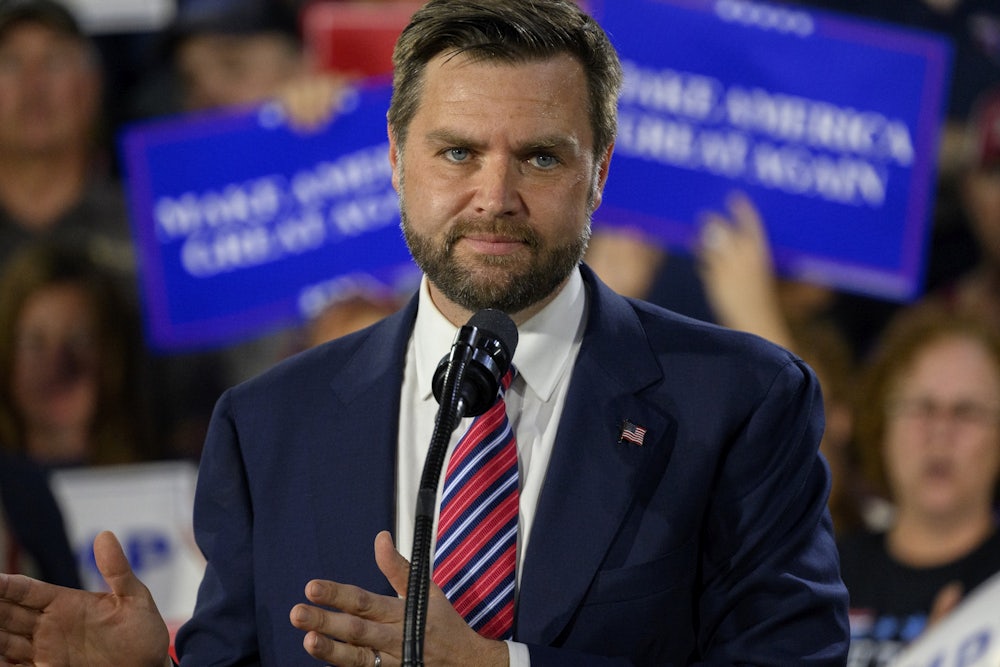How old does JD Vance think is too old to use the n-word? How about saying “I love Hitler” or making jokes about gassing your political enemies?
These are absurd questions to be asking of a vice president, but they keep coming up because he keeps brushing off revelations that young Republicans have used racial slurs and other hate speech by insisting they’re just kids. When Marko Elez, a 25-year-old DOGE staffer, was terminated earlier this year over racist, pro-eugenics tweets, Vance insisted that such revelations should not “ruin a kid’s life.” On Wednesday, when Politico published the contents of a group chat containing several young GOP leaders, Vance came to their defense in a similar fashion.
This is far worse than anything said in a college group chat, and the guy who said it could become the AG of Virginia. I refuse to join the pearl clutching when powerful people call for political violence. pic.twitter.com/kV57Wq7BLG
— JD Vance (@JDVance) October 14, 2025
This wasn’t a college group chat. Its members were leaders in the Young Republican National Federation, which includes members up to the age of 40. William Hendrix, the Kansas Young Republicans’ vice chair, used variations of the n-word. Peter Giunta, who was chief of staff for a New York assemblyman until he was fired on Tuesday, joked about murdering his opponents. Hendrix is 25. Giunta is 31. Vance, for what it’s worth, is 41. Before being tapped as Donald Trump’s running mate last year, he was also known to hang out in group chats with other young Republicans, some younger even than Hendrix. Is 41 too old to face consequences for your actions?
Vance’s repeated insistence that young adults should never be held accountable for using racial slurs is notable in and of itself. But his larger refusal to condemn depraved allies or even to distance himself from them is part of a larger trend. Most political norms—and the laws of political gravity that helped keep them in place—are long gone, replaced by an intense tribal loyalty that turns any scandal into an opportunity for whataboutism. This, it seems, is an early preview of Trump’s lasting political legacy: Republicans are no longer apologizing, nor are they pushing out racist, bigoted allies when they inevitably find themselves embroiled in controversy.
The vile contents of this leaked group chat are, as many have pointed out, not especially different from a great deal of what passes for discourse on the MAGA right. What is most notable about it, as Andrew Egger wrote in The Bulwark, is that the people involved are the product of a post-Trump culture that rewards “the most amoral and psychotic political strivers, and has held them up as a professional ideal for the young people coming up behind them to copy and emulate. This is what they know as the ticket to power.”
We might be giving Trump too much credit, however. The radicalization of young Republicans predates his political rise in 2015. The racist, pro-Nazi far-right rally in Charlottesville, Virginia, in August 2017 that left one young woman dead was full of young Republican leaders, many of whom had taken official positions before the start of Trump’s presidential campaign. As my former colleague Alex Pareene wrote in an extremely perceptive piece shortly after the Charlottesville rally, “Racial resentment has been a driving force behind College Republican recruitment for years, but at this point it’s really all they have left to offer.” Trump was a catalyst of the Republican Party’s transformation, but his rise was also a symptom of its radicalization and turn toward resentment, in other words. But young Republicans’ Nazi turn started long before his fateful trip down the Trump Tower escalator in June 2015.
Where Trump was different—and one reason why he is so uniquely beloved on the right—is that he provided a permission structure for Republicans to be publicly cruel and hateful. His rise came in no small part because he refused to be cowed or, for that matter, to ever apologize. In 2016, he was openly misogynistic to Megyn Kelly (now a staunch supporter), racist toward Blacks and Latinos, and contemptuous of anyone who opposed him (including war hero and former Republican presidential nominee John McCain). The controversy this generated was a virtuous cycle for Trump. He would say something inflammatory, pundits and politicians would criticize him, and he would not only refuse to back down but mock them as well—a media circus that sucked out all the oxygen from rivals and competitors.
Vance—and most pretenders to the throne—surely understands on some level that he lacks the strange charisma that is central to Trump’s brand. A great deal about Trump is fake—his wealth, his expertise, his skill, his golf handicap, his skin color and hair, for starters—but his contempt for his opponents is organic. But Vance recognizes that he can imitate the president in his refusal to throw any supporter under the bus—and that he won’t face any consequences from his MAGA-drunk party for doing so. So he invents spurious defenses for 31-year-olds making Hitler jokes and spouting racial slurs, rather than calling on them to apologize because doing the latter risks conceding that Republicans have a problem with racism (not to mention sexism, Islamophobia, homophobia, transphobia, and so on). It also risks alienating allies Vance knows he’ll need when he launches his own presidential campaign two years from now and staffers he’ll surely want to employ should it be successful.
Trump’s larger legacy is still being written, with more nightmarish chapters to come as the right lurches further toward xenophobia, nativism, and fascism. But it’s not clear if a figure like Vance will have the political capital and personal appeal to oversee the kind of authoritarian turn Trump is directing today. What’s already obvious is what Trumpism will look like after Trump: pedantic, cringey tweets by JD Vance defending a 31-year-old who said “I love Hitler.”






